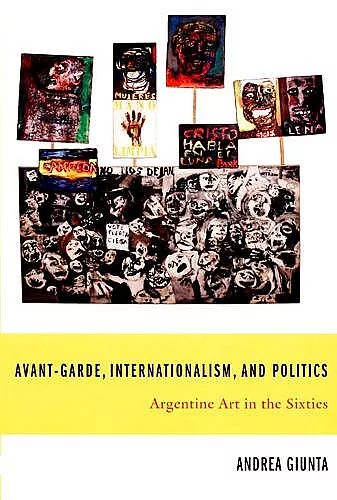Avant-Garde, Internationalism, and Politics
Argentine Art in the Sixties
Andrea Giunta author Peter Kahn translator
Format:Hardback
Publisher:Duke University Press
Published:16th Jul '07
Currently unavailable, and unfortunately no date known when it will be back

This book provides a comprehensive examination of the 1960s in Argentina, focusing on the efforts to establish an international identity for its visual arts. Avant-Garde, Internationalism, and Politics captures this dynamic period.
The 1960s marked a transformative period in Argentina, characterized by a vibrant cultural landscape following the isolation of the Peron era. This book, Avant-Garde, Internationalism, and Politics, delves into how artists, institutions, and critics collaborated to forge a new international identity for Argentina’s visual arts. Amidst a flourishing economy, visual artists, curators, and critics sought to intertwine art with political discourse, expanding the definition of art to include happenings and assemblages while striving for global recognition of innovative Argentine art.
Andrea Giunta, a distinguished Argentine art historian and critic, meticulously analyzes various initiatives aimed at internationalizing Argentine avant-garde art during the 1960s. She highlights key projects such as the introduction of contemporary international art exhibitions, the international study opportunities provided to Argentine artists, and the organization of prestigious art competitions involving renowned critics. The book also examines the socio-political context that facilitated these initiatives, particularly the U.S. Alliance for Progress, aimed at curbing communism in Latin America after the Cuban Revolution.
Throughout Avant-Garde, Internationalism, and Politics, Giunta explores the significant contributions of influential figures like Romero Brest and various artistic movements, including Nueva Figuración and Arte Destructivo. The narrative sheds light on the complex interplay between art and politics during this era, revealing how local identity sought to gain global recognition, while also reflecting on the impact of the post-Cold War environment on Latin American art and artists.
“Giunta carefully defines the polemics in transforming Buenos Aires into an internationally recognized center for artistic production and avant-garde culture. . . . Recommended.” - L. E. Carranza, Choice
“Giunta carefully defines the polemics in transforming Buenos Aires into an internationally recognized center for artistic production and avant-garde culture. . . . Recommended.” -- L. E. Carranza * Choice *
“Giunta has done an admirable job of organizing information from myriad sources. Her close focus on the art world reflects the paradox of Argentine identity: are Argentinians Europeans stranded in the New World or creators of a new nation? They can’t decide, and neither can the country’s artists.” -- Alfred Mac Adam * ARTnews *
“Giunta has done an admirable job of organizing information from myriad sources. Her close focus on the art world reflects the paradox of Argentine identity: are Argentinians Europeans stranded in the New World or creators of a new nation? They can’t decide, and neither can the country’s artists.” - Alfred Mac Adam, ArtNews
“Well written and thoroughly documented, this book is an invaluable tool for those interested in the evolution of contemporary art in Latin America (engulfed as it was in the love triangle Buenos Aires-Paris-New York). The choice of artists and images is superb. . . . Avant-Garde, Internationalism, and Politics is not just a book about history, it offers a fascinating explanation of the current state of Argentine and Latin American art in the era of globalization.” - Georgina Jiménez, Latin American Review of Books
“Meticulously researched and engagingly written. . . .” -- Robin Adèle Greeley * Oxford Art Journal *
“Meticulously researched and engagingly written. . . .” - Robin Adèle Greeley, Oxford Art Journal
“Well written and thoroughly documented, this book is an invaluable tool for those interested in the evolution of contemporary art in Latin America (engulfed as it was in the love triangle Buenos Aires-Paris-New York). The choice of artists and images is superb. . . . Avant-Garde, Internationalism, and Politics is not just a book about history, it offers a fascinating explanation of the current state of Argentine and Latin American art in the era of globalization.” -- Georgina Jiménez * Latin American Review of Books *
“Avant-Garde, Internationalism, and Politics is a precise and intelligent book. It is also profoundly original in its reconstruction of the public debate of the 1960s. Andrea Guinta has investigated the links between the artists and the revolutionary horizon, as well as those between the artists and establishment institutions. With this dual perspective, she follows in a fascinating way the processes of the internationalization of Latin American art. Her book is indispensable to understanding the political and aesthetic ideologies of the period.”—Beatriz Sarlo, author of Jorge Luis Borges: A Writer on the Edge
“Andrea Giunta is one of the sharpest minds working in the post–World War II cultural field anywhere, and Avant-Garde, Internationalism, and Politics is a work of amazing breadth, originality, and complexity. It touches on many facets of U.S. cultural life as well as on the many ways a Latin American country tried to find a suitable postwar identity in a ruthless historical moment. With this book, Giunta is redefining the parameters not only of art history in Argentina but of contemporary cultural discourses in general.”—Serge Guilbaut, author of How New York Stole the Idea of Modern Art: Abstract Expressionism, Freedom, and the Cold War
“How can artists and institutions from peripheral countries participate in global conversations?Mexican muralists, Brazilian avant-gardists, and the São Paulo Biennale have done it. Yet none have done so with as sophisticated a strategy as those who remade the visual and multimedia arts scene in 1960s Buenos Aires. Offering the most thoroughly documented and innovative analysis of that period, Andrea Giunta eloquently renews Latin American art criticism.”—Néstor García Canclini
“Duke University Press has performed an important service to the readers of Latin American art history and to historians in general by publishing a translation.” -- Donna J. Guy * American Historical Review *
ISBN: 9780822338772
Dimensions: unknown
Weight: 785g
432 pages